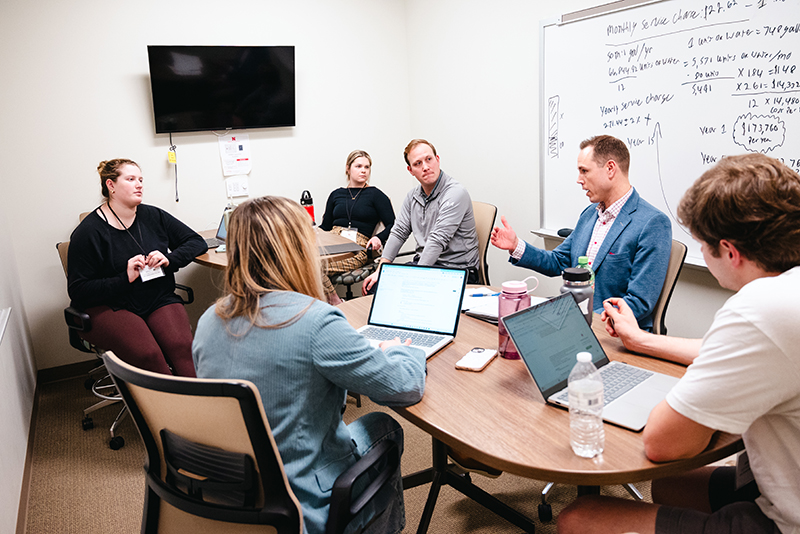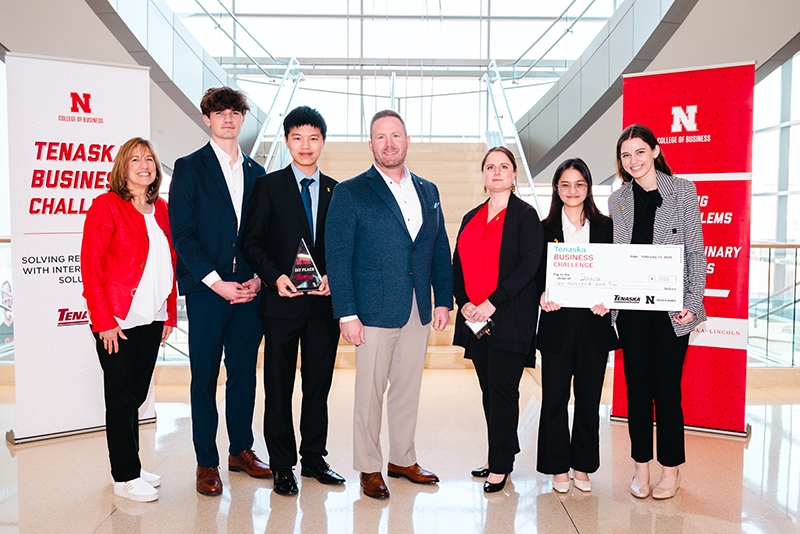Seventeen teams representing universities from seven states competed in the annual Tenaska Business Challenge held at the University of Nebraska–Lincoln College of Business, Feb. 21-23. Doubling participation in its second year, the competition challenged teams to propose interdisciplinary solutions to an energy demand issue in a case developed by Tenaska, a leading U.S. energy company ranked by Forbes magazine among the largest privately held U.S. companies.
 Professionals from Tenaska and Kiewit provided coaching to the teams.
Professionals from Tenaska and Kiewit provided coaching to the teams.
“All big problems are solved first by being curious, and these competitors had the opportunity to sharpen critical thinking and analytical skills that they will need to solve the complex challenges their generation will face,” said Chris Leitner, ’96, chief executive officer at Tenaska.
Teams were given just under 48 hours to analyze different options to meet increased energy demand at a university and propose a solution that considered cost and risk mitigation, energy reliability and environmental impact. After sharing the hypothetical business problem, Tenaska executives like Eric Gustavson, senior vice president of human resources capability, coached the students toward realistic and innovative recommendations that met key performance indicators.
“The students were very intelligent, creative, eager to learn and get feedback. Of the teams I coached, two made it to the top three, and they came at the case from totally different angles,” said Gustavson. “The diversity of thought and disciplines within teams made for better overall solutions and presentations because their capabilities as a team were so broad.”
Teams were provided 10 minutes to present their recommendations followed by a 10-minute question-and-answer period with judges. Participants presented in front of two sets of judges before results were tallied. Professionals from Kiewit — another leading Nebraska-based company — also helped coach the teams and were judges in the competition.
“I can easily say this was one of the more challenging cases I have completed, where my team and I crunched numbers and strategized all day and night to meet a tight deadline. That said, it was also one of the most rewarding college experiences I have had. I learned so much more about the energy industry as well as how I can utilize certain skills for my future career,” said Gemma Tipping, management and business analytics major at the University of Denver.
 The University of Iowa took first place in the competition for the second year in a row.
The University of Iowa took first place in the competition for the second year in a row.
Rose Hull, associate director of the Teaching and Learning Center, believes the competition's 100% growth in participants reflects the depth of Tenaska's involvement and word of mouth from past competitors being satisfied by their experience at Nebraska.
“Most case competitions focus on a major or one topic, but our shared goal is to highlight the importance of holistic and critical thinking," said Hull. "We greatly appreciate Tenaska and all who helped make this such a rewarding experience. Tenaska has been critical to the case development, assisting with ideating topics, coaching students so they receive valuable feedback and more."
The University of Iowa captured first place for a second year. Other finalists included second-place finisher Creighton University, third-place finisher University of Kansas and fourth-place finisher University of Denver. Three teams also received honorable mention prizes for team skills: Best Financial Analysis, University of Nebraska–Lincoln; Best Outside Research, Grinnell College; and Most Innovative Approach: South Dakota School of Mines & Technology.
Other competitors included Colorado State University; Fort Hays State University; Iowa State University; Kansas State University; Minnesota State University, Mankato; Oklahoma State University; and University of Nebraska at Omaha.
Nearly 50 teams of Huskers competed in a preliminary competition on Feb. 9, to see who would represent Nebraska in the multi-university round. The members of the two teams who advanced were: Mariano Azurduy, finance and economics major from Santa Cruz, Bolivia; Elijah Beninato, accounting and finance major from San Antonio, Texas; Cole Berrett, finance major from Omaha, Nebraska; Nicholas Coffey, finance major from Lincoln, Nebraska; Sebastiano Di Ruocco, economics and finance major from Omaha; Nikolas Mancio, business administration and finance major from Porto Alegre, Brazil; Thiago Pereira, business administration major from Salvador Bahia, Brazil; and Bruno Salles, accounting and finance major from Porto Alegre, Brazil.
Published: February 29, 2024